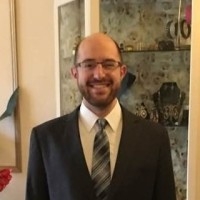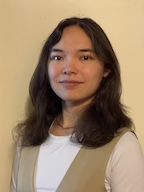Student Ambassadors Korean Graduate Program
Speaking with a master’s student ambassador is a great way to get a previous student’s perspective on the Language Schools graduate experience.

Michael Ormsbee
Hometown: Schenectady, New York
Program: Korean Master’s program
Current: Writing Instructor, University of Rochester
What surprised you about your experience at the Middlebury Language Schools?
I don’t think I was surprised by much as a graduate student. I attended the summer program twice before, so I was familiar with the immersion aspect of the Middlebury language schools, and I enjoyed it enough to want to return for the Masters program. I would say that each time I attend the language program, I’m surprised - and impressed - by how much time and effort the faculty put in to help students improve. It’s very hard to complete an immersive language program as a student, but I think it’s even harder to teach in one - teachers lead classes, supervise clubs, and talk with students during meals. It’s a level of dedication that has helped as a student, and inspired me as an educator.
Why did you choose to study at the Middlebury Language Schools?
I wanted to continue my study of Korean, to the point where I could do more than just read books in Korean or converse with people. I wanted to be able to teach other people who, like me, were inspired to study Korean but didn’t always have the resources, or who didn’t know where to start. Why Middlebury in particular? First, I had a lot of respect for the program already, after attending the summer immersion program in 2017 and again in 2022. Second, the fact that I could complete the Fall and Spring semesters online made it possible for me to make progress towards the degree while working full-time.
Please describe how your language skills improved due to your studies at Middlebury.
That’s probably a question better answered by one of my former teachers, although I’ll do my best. I think I’ve improved in many areas, and my vocabulary - especially vocabulary related to teaching and linguistics - has definitely improved. I can read Korean novels, newspapers, and scholarship in my areas of interest (literature, television, and film). I can communicate effectively with most people I interact with, and I’m confident in my ability to accomplish most tasks as they arise in daily life. However, I still struggle with speaking precisely at a natural pace (although I have this problem in English too), and sometimes my sentence structures are influenced by how I would usually express myself in English. Even though I am confident in my ability to teach Korean from the Beginner to Advanced levels, there are a lot of areas in which I want to improve. More than anything, I’m grateful for the environment at Middlebury, which encourages iterative practice and the willingness to make mistakes. Every time I leave Middlebury at the end of the summer, I feel like I’ve made substantial improvement, but also gained motivation and clarity for how I can continue to improve afterward.
What advice would you give someone wanting to attend the School of Korean?
For students interested in the 8-week immersion program, I’d recommend focusing on process over outcome. Language learning is an iterative process, and establishing a routine that works for you is usually better in the long run than overworking yourself for a single test or unit and then burning out. Being able to focus on only language learning for 8 weeks is an incredible opportunity, but it also takes a lot out of you - figuring out your optimal rhythms and routines, your preferred study methods, and how you like to recharge, are all steps that will help you get the most out of the Korean immersion program while setting you up for success once the program ends.

Jessica Brown
Hometown: San Antonio, TX
Program: Korean Master’s program
Current: Korean language teacher at the Korean American Cultural Center of San Antonio
Why did you choose to study at our School of Korean?
I heard about the rich quality and history of the Language Schools and was interested in pursuing a unique language experience while obtaining my Master’s degree. The opportunity to be surrounded by other people who were passionate about the Korean language inspired me to improve my language skills even further. Additionally, the structure of the Korean Graduate Program allowed me to establish a balance between language immersion opportunities, my involvement in the Korean American community, and academically stimulating classes.
What surprised you about your experience at the School of Korean?
The way that the students adapt, create, and linguistically progress while connecting with those around them. I was able to communicate with learners that were beginners, advanced learners, and staff. I was able to be exposed to the depth of their motivation and love for the language. It was truly a memorable experience being around others who love Korean and are dedicated to learning it.
Why did you choose to return to our School of Korean?
As I progressed through my degree program, I was inspired and motivated to improve my language skills. Additionally, I was inspired by what I was learning. I wanted to see how far I could improve through the program. The language schools truly provide an environment that is unique and valuable for learning languages.
Please describe how your language skills improved due to your studies at Middlebury.
After spending time in the immersion programs, I gained a fuller picture of how my first and second languages interacted with each other. Being in the immersion program, and having the dependence of my first language lowered, I was able to take more chances to truly live through my second language. It helped to build my confidence in my language skills, while also gaining new perspectives of other speakers.
Describe a typical day at our School of Korean.
As a graduate student I would have classes during the day. I believe this is similar to the 8-week immersion students. In the afternoon I would study in our dorm common areas or the library. During mealtimes, I was able to spend time with other students and staff. All of which were passionate about the Korean program, and were more than welcoming. Finally, there were various activities and clubs that I was given the opportunity to go to later in the day. While there is a structure from classes and mealtimes, there is also flexibility in what clubs, events, and other activities that students would like to participate in.
What advice would you give someone wanting to attend the School of Korean?
There are 3 things that helped me during my time at Middlebury. The first is always remembering why I am learning the language. Remembering my passion and motivation to learn Korean helped me when I was feeling overwhelmed and challenged. The second is remembering that over perfection, progress is more important. Mistakes and questions help us learn. Finally, it is more than just the language, it is about connecting with others. Learning to connect with others through Korean is an experience that will inspire you to go further in your language journey than you thought possible.
If you would like to connect with a student ambassador to ask questions, please contact Robin Piya, School of Korean Assistant Director, at schoolofkorean@middlebury.edu.
